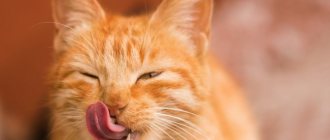All cat owners love to be affectionate with their pets, but sometimes this becomes impossible due to the unpleasant odor from the animal’s mouth. If this situation occurs once, then there is no need to worry, but if the cat’s breath stinks with enviable frequency, it is better to show the pet to the veterinarian. The oral cavity is the top of the gastrointestinal tract, and underneath it can hide an entire iceberg of diseases and ailments, which are signaled by bad breath in a cat. The causes of this phenomenon, called halitosis, can be varied, and without a doctor it is impossible to understand them.
Normal and abnormal odor from a cat's mouth
There are many shades of unpleasant and putrid stench. Strictly speaking, cats cannot smell like anything at all, since they are predators. Most often, they smell of the faint aroma of the food they consumed. Bad breath in a cat becomes pathological when it lasts too long or gives off sharp and unpleasant notes. Usually this indicates gastrointestinal disorders or diseases of the oral cavity, but there are also particularly “fragrant” brachycephalic breeds:
- Persians, especially extreme sportsmen;
- exotics;
- British;
- Scots.
Of the cats with a normal nasopharynx structure, the stench most often emitted by sphinxes due to caustic gastric juice and fashionable Maine Coons with Abyssinians, in which overgrown gum tissue sometimes becomes inflamed.
In kittens
Typically, kittens have not yet acquired gastrointestinal diseases, so their bad breath appears due to injuries to the gums and palate or excessive growth of bacteria during the process of changing teeth.
In case of injury, the mouth ceases to smell as the tissue heals, and in the second case, the odor evaporates when the replacement of milk teeth with molars is completed.
In adult animals
The average age is considered to be from 1 to 8 years. a cat develops bad breath in this age range
- infections of various etiologies affecting the oral cavity;
- diseases of internal organs;
- feeding cheap, low-quality food;
- various dental problems: caries, plaque, tartar;
- neoplasms of mucous membranes;
- lack of oral hygiene.
Each of the listed reasons is divided into a dozen more nuances, therefore, if you smell the stench from your pet, it is better not to guess, but to contact a specialist to solve the problem
In older individuals
Over the years, your pet does not get any younger, and in old age it may develop a variety of chronic and other diseases. The problems of mature cats include diseases such as:
- periodontal disease;
- kidney and liver diseases;
- hormonal disorders;
- stomach ulcer;
- diseases of the endocrine and cardiac systems.
You need to make allowances for age and not judge your aging pet too harshly, but it is better to check everything thoroughly to know that the stink does not relate to anything vital.
Prevention
Halitosis is rare in healthy animals, so the following recommendations will help prevent your adult cat or kitten from developing bad breath:
- regular examination by a veterinarian;
- teaching kittens to brush their teeth from a very early age;
- properly selected diet;
- timely treatment of the cat for parasites;
- compliance with the vaccination schedule.
Rotten breath is one of the main indicators of a cat's health and how well it is being cared for. Even minor health problems with a pet, which the owner may not attach importance to, sometimes have serious consequences and pose a threat to the animal’s life. Therefore, if a bad odor appears from your pet’s mouth, it is best to show it to a veterinarian.











